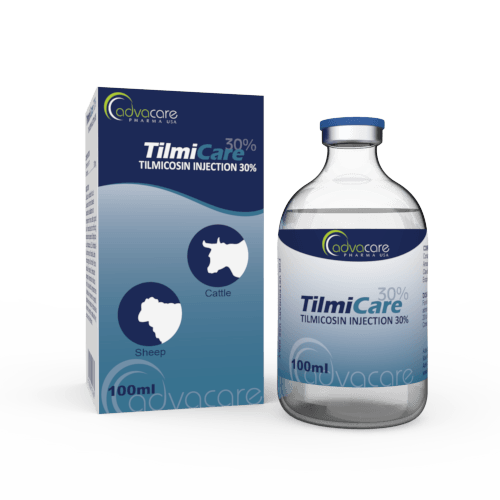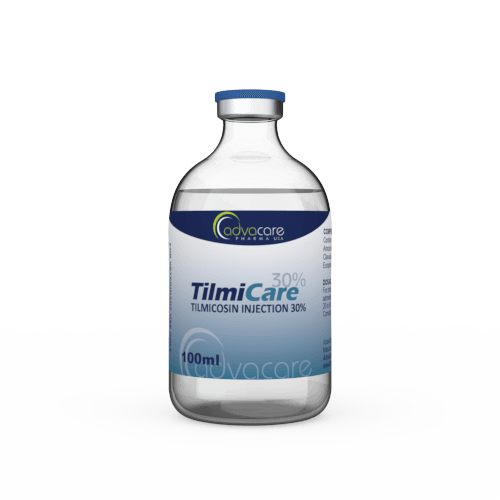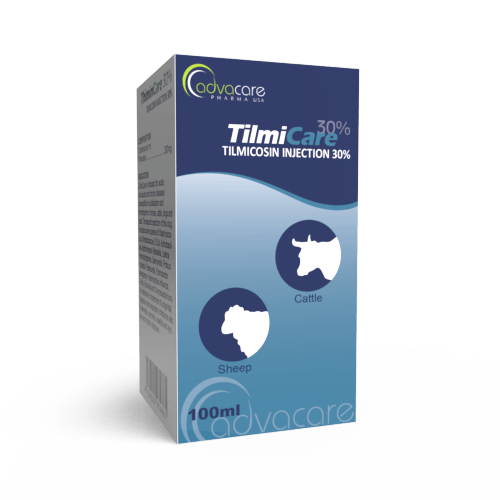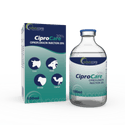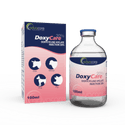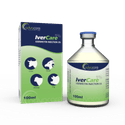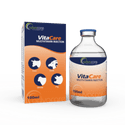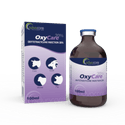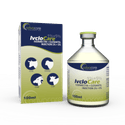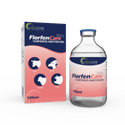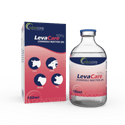- Home›
- Veterinary Pharmaceuticals›
- Veterinary Injections›
- Veterinary Liquid Injections›
- Tilmicosin Injection
Tilmicosin Injection
Dosage
Packaging
What is Tilmicosin?
Active Ingredients: Tilmicosin
Tilmicosin Injection is an antibiotic drug used to treat various types of infections in animals like cows and sheep. It is indicated for the treatment of respiratory infections, ovine mastitis, ovine foot rot, and interdigital necrobacillosis (pododermatitis) that are caused by susceptible microorganisms.
Tilmicosin is a semi-synthetic macrolide antibiotic. It works by inhibiting protein synthesis. Tilmicosin shows a broad spectrum of activity against Mycoplasma and gram-positive organisms, such as Staphylococcus, and some gram-negative bacteria like Pasteurella multocida and Mannheimia haemolytica.
Tilmicosin Injection is administered primarily by subcutaneous or intramuscular routes. The dosage and duration of treatment depend on the type of infection and the species of animal being treated. The drug is generally well-tolerated by animals, but like all medications, it can have side effects, the most common including injection site reactions. In severe cases, anaphylaxis may occur, necessitating immediate veterinary attention.
One important aspect of tilmicosin's use is its environmental impact. As an antibiotic, it can contribute to the development of resistant bacteria, which can be a public health concern. This is why its use is regulated in many countries, and it is often reserved for situations where other, less potent antibiotics are ineffective.
Tilmicosin residues can enter the environment through animal waste, potentially affecting non-target organisms. This emphasizes the need for responsible use and disposal practices.
It is important to note that Tilmicosin Injection is for veterinary purposes only. It is not approved for use in humans due to its potential for severe toxicity, including fatal respiratory distress.
AdvaCare Pharma is a GMP-certified manufacturer and supplier of Tilmicosin Injection. This livestock medication is produced in our facilities located in China, India, and the USA. We routinely inspect our production facilities to ensure our products meet quality and safety standards.
Why are we a trusted Tilmicosin manufacturer?
Tilmicosin Injection is manufactured and globally distributed by AdvaCare Pharma, a leading manufacturer of veterinary injections in the pharmaceutical industry. We have been committed to distributing high-quality, GMP-certified veterinary medications for the global market over the past 20 years. As a top Tilmicosin manufacturer, we ensure that all of our 100+ veterinary injections surpass our distributors' requirements by conducting routine internal and third-party facility audits.
Uses
What is Tilmicosin used for?
It's used to treat
- respiratory infections (Mannheimia haemolytica, Pasteurella)
- ovine mastitis (Staphylococcus aureus, Mycoplasma)
- interdigital necrobacillosis
- ovine foot rot (Dichelobacter nodosus, Fusobacterium necrophorum)
Is a prescription required to purchase Tilmicosin Injection?
Yes, Tilmicosin Injection is a prescription medication, and it should only be obtained and administered under the supervision of a licensed veterinarian.
What animals can be treated with Tilmicosin Injection?
This drug is designed to be used for sheep and cows.
Is Tilmicosin used in poultry or swine production?
It is not recommended for use in poultry or swine. Different antibiotics are chosen for these species due to their specific needs and susceptibility patterns.
What is the mechanism of action of Tilmicosin?
Tilmicosin works by inhibiting bacterial protein synthesis, specifically targeting the 50S ribosomal subunit. This disruption prevents the growth and reproduction of susceptible bacteria, preventing it from growing, replicating, and ultimately surviving. As a result, the infection is controlled, and the animal's immune system can better combat the remaining bacteria.
How is a Tilmicosin Injection used?
This medication has been manufactured as a liquid, which is packaged in a vial. It is intended to be administered by subcutaneous injection. Tilmicosin Injection is intended for veterinary use only.
Can Tilmicosin be used as a preventive measure against bacterial infections in livestock?
It is primarily used to treat existing infections and is not typically administered preventively.
Is Tilmicosin available in different concentrations or formulations?
Tilmicosin Injection is available in a standard concentration of 300mg/ml (30%). It is sold in a 10ml, 20ml, 30ml, 50ml, 100ml, and 500ml vial per box.
What is the withdrawal period for Tilmicosin?
The withdrawal time is 9 days for meat. This means that animals treated with it should not be slaughtered for meat until at least 9 days after the last treatment to ensure that residues have cleared from their systems.
Can Tilmicosin Injection be used in combination with other antibiotics?
Tilmicosin Injection should not be used concurrently with macrolides, lincosamides, or ionophores. Combining Tilmicosin with these classes of antibiotics can lead to adverse drug interactions or decreased efficacy. Always consult a veterinarian for guidance.
Can Tilmicosin Injection be administered by livestock owners themselves?
Tilmicosin is a prescription drug and should be administered by or under the guidance of a licensed veterinarian. Self-administration by livestock owners is discouraged to ensure proper dosage and safety.
Can Tilmicosin be used to treat viral infections in livestock?
No, Tilmicosin is an antibiotic and is only effective against bacterial infections. It does not have antiviral properties and should not be used to treat viral illnesses in animals.
Can Tilmicosin be used in combination with other non-antibiotic medications or supplements?
Medications like erythromycin, azithromycin, and clarithromycin (which are also macrolides) should be used cautiously in conjunction with Tilmicosin, as they may potentiate each other's effects or lead to adverse reactions. The same can be said of drugs that are known to impact liver function.
How should Tilmicosin Injection be stored?
This medication should be stored in a dark, dry location under 30°C. The vial should be securely sealed at all times to prevent moisture or contaminants from affecting the integrity of the medication.
Dosage
How much Tilmicosin Injection should be given to cows and sheep?
The usual dose is 10-20mg per kg body weight, given as a subcutaneous injection. In sheep greater than 15kg, administer a single subcutaneous dose of 10mg/kg of body weight (1ml/30kg). Do not inject more than 10ml per injection site.
Can Tilmicosin Injection be administered orally or intravenously to cows and sheep?
No, it should be administered via subcutaneous injection under the skin. It is not intended for oral or intravenous use.
Where should the drug be injected?
Injection under the skin in the neck is suggested. If not accessible, inject under the skin behind the shoulders and over the ribs. The precise weighing of animals is important to avoid overdose. The diagnosis should be reconfirmed if no improvement is noted within 48h.
How often should Tilmicosin Injection be administered?
Typically, it is administered as a single dose, but in some cases, a second dose may be required if there is no improvement within 48 hours. Always follow the prescribed dosing schedule.
Is it necessary to withhold food or water before or after administering Tilmicosin Injection?
The drug is usually administered without the need for fasting or withholding water. Specific instructions regarding food and water restrictions should be discussed with a veterinarian.
What should be done if more than 10ml per injection site has been given?
Consult a veterinarian immediately.
In case of overdose, what should be done?
Overdosing can lead to adverse reactions, including severe injection site reactions. If such occurs, seek immediate veterinary assistance at once.
Refer to a veterinary doctor or pharmacist for guidelines on dosage.
Side Effects
As with all pharmaceuticals, some unwanted effects can occur from the use of Tilmicosin Injection.
Some common side effects may include but are not limited to:
- swelling
- head drooping
- lethargy
Serious side effects may include:
- allergic reaction
- ataxia
Signs of possible toxicity from using Tilmicosin Injection in animals may include severe injection site reactions, respiratory distress, nervous system effects such as tremors or seizures, and gastrointestinal disturbances like diarrhea or vomiting.
Severe allergic reactions characterized by hives, swelling of the face or throat, itching, or anaphylactic shock can also occur.
For a comprehensive list of all possible side effects of this medication, consult a veterinarian.
Precautions
Do NOT use Tilmicosin Injection for an animal that:
- has a known allergy or hypersensitivity to any of the ingredients.
- is being treated with macrolides, lincosamides, or ionophores.
- belongs to the following species: equine, porcine or caprine.
Treatment with this drug should be administered with caution if an animal:
- is pregnant or lactating.
- is being treated with adrenalin or β-adrenergic antagonists.
When using Tilmicosin Injection, monitor for signs of adverse reactions, especially in animals with a history of sensitivity to macrolide antibiotics. The drug should be used with extreme caution in animals with impaired liver function, as they may have reduced ability to metabolize and excrete the medication.
Tilmicosin should be used with caution in animals with impaired renal function, as the drug is primarily eliminated through the kidneys. Dosing adjustments may be necessary.
Avoid accidental self-injection by humans, as Tilmicosin can cause serious adverse effects, including fatal respiratory depression.
What are the most common animals Tilmicosin Injection is used for?
Tilmicosin Injection is commonly used in both cows and sheep for the treatment of various bacterial infections. - Cows: In cows, it is often administered to address respiratory infections caused by pathogens like Mannheimia haemolytica and Pasteurella multocida. The medication is typically given as a subcutaneous injection in the neck region, behind the shoulders, or over the ribs. - Sheep: In sheep, it is used to address respiratory infections caused by pathogens such as Mannheimia haemolytica and Pasteurella multocida. It can also aid in the management of ovine mastitis, which is often associated with bacterial agents like Staphylococcus aureus and Mycoplasma.

You might be interested in...
Why AdvaCare Pharma?
As an industry leader, we are aware of our responsibility to provide affordable and sustainable solutions to improve healthcare worldwide.
